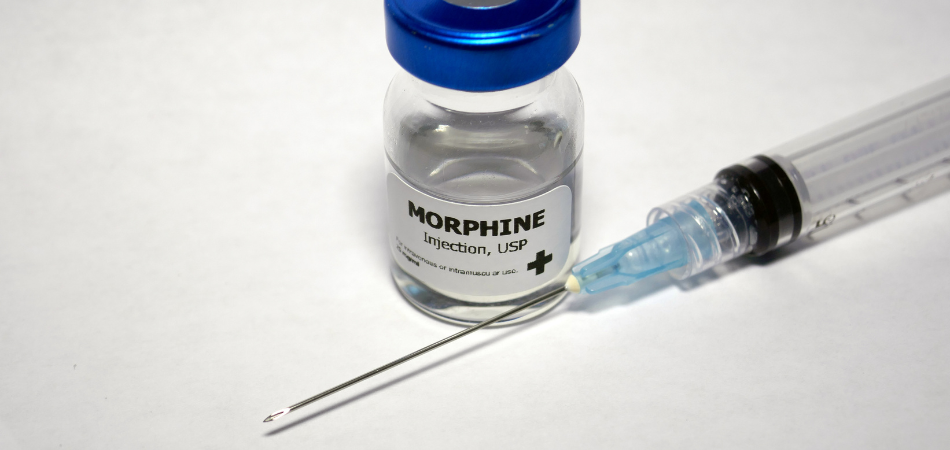
Written by:

Medically Reviewed by:
Last Updated:
February 14th, 2025
Morphine addiction
What is morphine?
Morphine is a powerful opioid painkiller used in medicine to manage severe pain, often after surgery or in cases of terminal illnesses like cancer. It works by blocking pain signals in the brain, providing significant relief for patients who need strong pain management.
In the UK, morphine is classified as a controlled substance under the Misuse of Drugs Act 1971, meaning it can only be prescribed by a doctor for medical purposes.
While highly effective, it must be used with caution due to its potential for addiction and serious side effects if misused.

Is morphine addictive?
Morphine works by binding to opioid receptors in the brain and spinal cord, which blocks pain and creates feelings of euphoria and relaxation. This intense pleasure can make a person want to continue using morphine, even if they don’t need it for pain management anymore.
Over time, the brain starts to rely on morphine to release feel-good chemicals like dopamine, and it becomes harder to feel pleasure without the drug. This leads to tolerance, where the person needs more of the drug to get the same effect. Eventually, dependence sets in, making it difficult to stop using morphine without experiencing withdrawal symptoms like nausea, anxiety or muscle aches.
Because of this, even when used as prescribed, there’s always a risk of developing an addiction to morphine, especially with long-term use or higher doses.
How can a morphine addiction begin?
Many people’s first introduction to morphine might come from seeing patients in hospital beds using a button to administer more of the drug when they’re in pain. This often leads to confusion about how something that seems so tightly controlled and hospital-exclusive can find its way to fuelling an addiction. The reality is there are various ways a morphine addiction can begin.
Below, we take a closer look at some common ways this can happen.
Using morphine for pain management after surgery or injury
Morphine is frequently prescribed for pain relief after surgeries or serious injuries. While it’s effective, prolonged use can lead to a growing dependence. What starts as legitimate use to manage pain can gradually turn into reliance as the body builds a tolerance and craves more to achieve the same level of relief. This can be particularly challenging when a person continues using morphine even after the pain has subsided.
Not following prescribed dosages
Even when morphine is legally prescribed, there’s always the risk of misuse if dosages aren’t followed carefully. Some individuals may take more than prescribed, either because the prescribed dose isn’t giving enough relief or they start to feel the euphoric effects of taking more. Over time, this can lead to addiction without the person even realising it.
Recreational use
Morphine can also enter the hands of those seeking its euphoric effects recreationally. Whether through illicit purchase or borrowing someone else’s prescription, using morphine recreationally quickly puts a person at risk of addiction. The strong, pleasurable sensations it produces make it highly addictive, even after just a few uses.
Psychological dependence
For some, morphine provides an emotional escape from stress, anxiety or other mental health challenges. The relief it offers can become more than just physical pain management, creating a psychological dependence. When someone begins to rely on morphine as a coping mechanism, they are at risk of developing a strong emotional connection to the drug, which can lead to addiction.
Using someone else’s medication
It’s not uncommon for people to share medications, especially within families or close groups of friends. While it may seem harmless to borrow morphine from a loved one for pain relief, this can quickly spiral into misuse. Since morphine is such a potent drug, using even a small amount without proper medical supervision can set the stage for dependence and addiction.
What are the signs of morphine addiction?
It’s crucial to be aware of the signs of morphine addiction, especially if you’re concerned about a loved one. Addiction can creep in gradually, and recognising the early warning signs can make all the difference in getting help sooner rather than later. By identifying these signs, you can take action before the situation becomes more serious, offering the support they need to seek recovery.
Physical signs
- Increased tolerance: Needing higher doses of morphine to feel the same pain relief or effects is one of the earliest signs of addiction.
- Withdrawal symptoms: Symptoms like sweating, shaking, nausea, and muscle pain can occur when not using morphine.
- Drowsiness or lethargy: Frequent drowsiness, nodding off, or extreme fatigue can signal overuse.
- Pinpoint pupils: Reduced pupil size, especially in low light, is a common physical effect of morphine use.
- Constipation: Ongoing use of morphine can lead to chronic constipation.
Psychological signs
- Obsessive thoughts about morphine: Constantly thinking about the next dose or when and how to obtain more.
- Mood swings: Extreme highs and lows, irritability or anxiety when unable to access morphine.
- Neglecting responsibilities: Losing interest in work, social activities or personal relationships due to morphine use.
Behavioural signs
- Doctor shopping: Going to multiple doctors or clinics to obtain additional morphine prescriptions. (Note: This behaviour tends to happen more often in countries with privatised healthcare systems.)
- Secrecy or isolation: Hiding morphine use from friends and family or avoiding social situations altogether.
- Financial problems: Spending excessive amounts of money on obtaining morphine which can lead to financial difficulties.
Recognising these signs early can make a significant difference in seeking help and starting the recovery process.
Can Liberty House help with morphine addiction?
At Liberty House, we understand how challenging it can be to face morphine addiction, whether it’s your own or someone you care about. Our dedicated morphine addiction treatment programme offers a compassionate and supportive environment to help individuals break free from dependency.
The programme begins with a thorough assessment, followed by a medically monitored detox to manage withdrawal symptoms safely and comfortably. After detox, we offer a range of therapies, including one-to-one counselling, group therapy and holistic approaches like yoga and art therapy, to address the root causes of addiction. Our aftercare services also ensure long-term support so you can confidently continue your recovery journey.
If you or a loved one is struggling with morphine addiction, don’t wait to seek help. Reach out to Liberty House today and take the first step towards a healthier, more fulfilling life.







